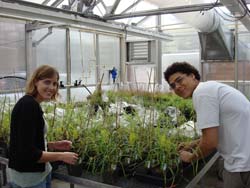

Our academic programs train students to become knowledgeable and capable biologists. Undergraduates and graduates work closely with our faculty—in the classroom, in the lab, and in the field.
Our undergraduate and graduate curricula are designed to provide students with the flexibility to specialize in particular sub-disciplines through coursework, independent study, and/or research opportunities within our department and with our colleagues in other departments and institutions, including the nearby Texas Medical Center and the Houston Zoo.
EEB faculty members are dedicated educators, using a blend of traditional and innovative teaching methods to accommodate students with diverse learning styles. Interactive lectures and seminars expose students to the latest discoveries and outstanding research questions in ecology and evolutionary biology, while inquiry-based labs challenge students to apply their knowledge in order to collect and analyze data in the lab and the field.
Our on-campus facilities include modern classrooms equipped with state-of-the-art educational technologies as well as a dedicated teaching lab. Field courses capitalize on Houston’s proximity to diverse habitats and regularly visit nearby parks, preserves, and research stations in coastal plain forests; coastal prairies; fresh, brackish, and saline marshes; estuaries; and near-shore marine environments. A summer course on tropical field biology travels to Belize to examine first-hand the biology of the two most diverse ecosystems on earth: the coral reef and the tropical rainforest.
Research areas are housed in attractive laboratories and a Greenhouse. This EEB Greenhouse is located immediately adjacent to the departmental home in Anderson Biology Labs. The 3500 sq ft. facility is divided into five independent modules, each containing a programmable automatic watering & fertilization system with a choice of domestic or reverse osmosis water. Cooling/heating is provided independently to each module via its own 22-ton HVAC unit. Head house support (soil and pot storage, potting and root washing tables) is located nearby in departmental space.
The EEB Teaching Lab is home to a growing collection of living and preserved specimens that represent the diversity of life here in southeast Texas and in the world.
In addition, there are federal, state, and private refuges, parks, experimental stations, and preserves available for field research within the city or driving distance of the campus. Habitats include southeastern coastal plain forests; coastal prairies; fresh, brackish, and saline marshes; estuaries; and near-shore marine environments. Moreover, Houston is host to numerous centers providing state-of-the-art environments to conduct genome analyses and bioinformatics.
 Biology began at Rice in 1912 with the appointment of Julian Huxley as the biology professor. Julian Huxley was the grandson of Thomas H. Huxley, a biologist himself and champion of Charles Darwin. Julian made many important contributions to the fields of ethology, ecology and cancer research, and was a powerful proponent of neo-Darwinism. His efforts are commemorated by the Huxley Fellows program, in which recent Ph.D. recipients are appointed for 2-3 year (non-tenure) faculty positions in EEB.
Biology began at Rice in 1912 with the appointment of Julian Huxley as the biology professor. Julian Huxley was the grandson of Thomas H. Huxley, a biologist himself and champion of Charles Darwin. Julian made many important contributions to the fields of ethology, ecology and cancer research, and was a powerful proponent of neo-Darwinism. His efforts are commemorated by the Huxley Fellows program, in which recent Ph.D. recipients are appointed for 2-3 year (non-tenure) faculty positions in EEB.
The Department of Ecology and Evolutionary Biology was formed in 1989, and has strengths in intraspecific cooperation (social evolution), interspecific interactions, mutualism, plant-insect interactions, invasive species, genomics, molecular evolution, speciation, and organismal strengths in plants, insects, and microbes. We are housed in the first and second floors of Anderson Biology Lab with the department greenhouse adjacent to the building.
Faculty members are leaders in their fields, famous for solving important questions, and for involving undergraduates in the excitement of research. This Department is ready to pioneer new areas and to lead not only at Rice but on the global stage. Indeed, their interactions with the Texas Medical Center have contributed to recent pioneering work that has garnered significant international visibility in the understanding of social behavior at the genetic level.
Most faculty serve on editorial boards and professional committees, participate in national and international organizations, guide graduate students, and serve the university and the larger community in many capacities. Frequent seminars are given by visitors from major U.S. and international universities. These stimulate collaborative research efforts and provide a forum for the interchange of ideas.
July 1, 2014 the Departments of Ecology & Evolutionary Biology and Biochemistry and Cell Biology merged to form BioSciences at Rice.
Our talented students are competitive for numerous distinctions, awards and scholarships, both locally and nationally. EEB undergrad alumni include a Rhodes Scholar as well as several recipients of NSF Graduate Fellowships.
EEB Graduate students have also received multiple grants and fellowships including NSF Doctoral Dissertation Improvement Grants (DDIG), Ford Foundation Fellowships, NSF Postdoctoral Research Fellowships, Schlumberger Faculty for the Future Fellowships, and AAUW Fellowship, to name a few.
In addition each year Ecology & Evolutionary Biology gives out the following awards:
- Julian Huxley Award
- Clark Read Award
- Joe Davies Award
- Best RURS Poster
